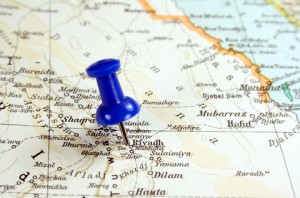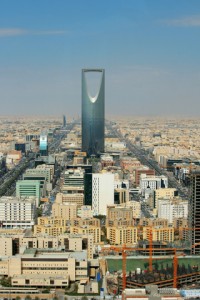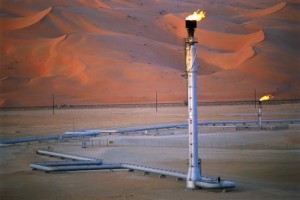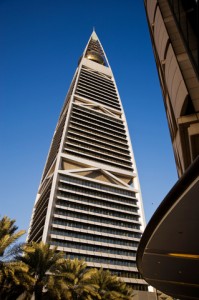[Updated Oct 2020] A guide to serviced offices and office space to rent in Riyadh as well as general information that may be useful if you are thinking of renting office space in the city.
For further offices information or to search office space for rent in Riyadh just click. Or contact us for any other office space query.

Arabian heartlands
Riyadh lies right in the heart of the Arabian peninsula and is the capital city of modern-day Saudi Arabia. Its recorded origins date back to before the foundation of Islam and to a time when the Nejd region was inhabited by different tribes that spent much of their time at war with one another or with outside forces.
The Banu Hanifa tribe is credited with having founded the settlement that has gone on to become one of the most important sites in the Middle East but for hundreds of years, it was known as Hajr and lay in the province of Al Yamamah. The city was controlled by various locally powerful empires in the years preceding 630 AD but it took a more prominent role in its own right during the Ridda Wars that followed the founding of Islam in Mecca, a few hundred miles to the south-west.

Hajr was the largest settlement in Al Yamamah right up until the 14th century when legendary traveller of the Islamic world Ibn Battuta passed through on his way to Mecca on pilgrimage. For somewhat obscure reasons the city was eventually to become known as Riyadh, with the first reference to it as such dating from the 17th century.
Saudi States
There have been numerous attempts to bring about the formation of a country similar to that which we now know as Saudi Arabia. Three of the best known and most successful efforts to this end resulted in the creation of the three Saudi States – the first two of which were formed and then fell during the 18th and 19th centuries respectively.
Muhammad ibn Abd al Wahhab and Muhammad ibn Saud were the two men principally responsible for founding the First Saudi State in 1744 and their two families have been closely linked, partly through marriage, ever since. The First Saudi State had Riyadh as its capital and its founding resulted in dramatic changes throughout the region, with the overriding theme portrayed as a return to traditional Islamic values and practices.
Both Muhammad ibn Abd al Wahhab and Muhammad ibn Saud left their own indelible marks on the way life in Riyadh and the Arabian Peninsula was to develop during the subsequent 250 years or so, with the former having a huge influence on the Islamic faith and the latter founding the House of Saud, which remains the country’s royal family.
The Second Saudi State was rather less successful than the first in terms of the territory it took but it nonetheless lasted from 1824 to 1891, with Riyadh again as its capital and mainstay. The city was taken soon after by the Al Rashid clan in the late 19th century but the House of Saud was again restored to power in 1902, with the now legendary King Abdul-Aziz Ibn Saud in command. The third and current Saudi State was formally established in 1932, with one of Ibn Saud’s three dozen sons King Abdullah on the throne at present.
An oil economy
Saudi Arabia has the largest proven oil reserves of any country on earth and this remarkable abundance of a resource so sought after by virtually every other country in the world has inevitably had an impact on its capital city. A sizeable proportion of the Saudi Arabian economy is based entirely on the exploitation and export of its oil reserves, with the majority of the annual national budget revenues originating from the sector.

It seems likely that Riyadh’s economy and its worldwide perception will be linked to oil for many years to come but steps are being taken to promote a more diversified economy and the city is gaining a reputation as a regional leader in various high-tech and banking-related industries. In addition, the city is, as it has been for centuries, a centre of commercial activity and all manner of region-wide trading.
Architecture
Prior to the modern era and the Third Saudi State, virtually all of the buildings in and around Riyadh were made from clay or mud-bricks, which unfortunately means that the huge majority have not stood the test of time. There are exceptions, with perhaps the best known being the Masmak Fort, which still stands in the centre of Riyadh and was an important site in Ibn Saud’s recapture of the city just over a century ago.

Modern constructions in the Saudi capital could hardly look more different to their century-old counterparts, with some of the most incredible skyscrapers in the world to be found in the city’s main business district. Among them are the Kingdom Centre, which reaches up close to 1,000 ft and hosts the Four Seasons Hotel, and the 44-storey Al Faisaliyah Centre, which was designed by the renowned British architect Norman Foster.
Office space for rent in Riyadh
The majority of office space to rent in Riyadh at present is to be found in the central business district, where much of its commercial activity goes on but major development projects are underway that will see new office space made available in different parts of the city, principally to the north. The Saudi economy grew only slightly in 2012 but is expected to see growth rates of closer to 3.5 per cent for the next few years at least. As a result, there is likely to be considerable demand for office space in the capital for the foreseeable future.
Even so, the real estate analysts at DTZ recently expressed some concern that there will be an over-supply of office space to rent in Riyadh over the next year or so, simply because so many new developments are set to come on stream at roughly the same time. Speaking to Cityscape Intelligence, the company’s head of consulting Martin Cooper described Riyadh as being “one of the most cost-effective locations in the Middle East region for office space”, ahead of its most notable nearby rivals Abu Dhabi and Dubai.
Tourism and business travel
Riyadh is not often considered as a holiday destination of choice for Western travellers but the city benefits from the many millions of people who visit Saudi Arabia as part of their pilgrimage to Mecca. For those who can afford them, the city boasts some of the most spectacular and luxurious hotels in the world, not least the Four Seasons or the Al Faisaliah Hotel. Of course, there is plenty of demand for business travel accommodation in Riyadh and places like the Radisson Blu and the Sheraton Riyadh offer overnight or longer-term hotel experiences that would be hard to top in the Middle East or anywhere else.
Sport
Possible because it is located in the middle of the Arabian desert, there has not been a particularly strong tradition of sporting prowess in Riyadh, at least not on an international stage. However, there is plenty of enthusiasm for football and cricket, with the local teams in both sports counted among the very best in the country. Elsewhere, investment in high-quality indoor arenas and facilities is helping the next generation of Riyadh youngsters practice their disciplines away from the baking heat of the Arabian sun.
Transport
In terms of transport, Riyadh is now well served by fully-modern ring roads and highways keeping traffic flowing to and from each area of the city. King Fahd Road is perhaps the most widely used street in the centre of town as it runs right through the heart of what must be one of the busiest areas in the Middle East.

Railways link Riyadh with the other major Saudi cities, including Mecca and Jeddah, while buses get plenty of people to and from their places of work each day. The most dramatic aspect of Riyadh’s transport infrastructure though is its airport, which is named after King Khalid, takes millions of passengers each year and accommodates several dozen of the leading airlines from across the region and the world.
We carry out a free office space search and our advisory and acquisition services are also free, always. Our Riyadh office space brokers and agents are globally regulated by the Royal Institution of Chartered Surveyors (RICS) ensuring the highest standards of commercial property advice and service at all times. We look forward to helping you find the best office space for rent for your business.

The Office Providers are Regulated by the Royal Institution of Chartered Surveyors (RICS)